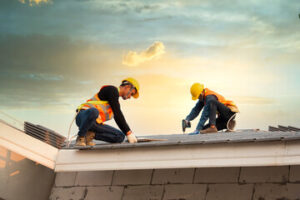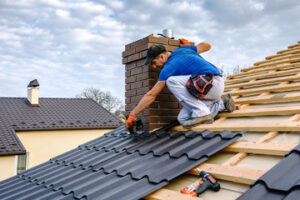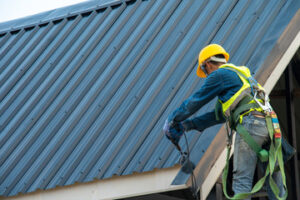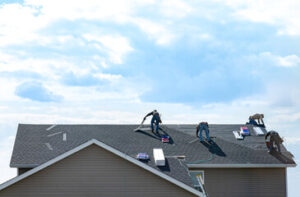Commercial Roofers Denver re-roof large buildings. They use various materials for these projects, such as asphalt shingles, wood shakes and tile. They also nail plywood to wooden rafters and lay a protective underlayment.

They also offer a variety of benefits to building owners, such as dependable guarantees, accountability and extensive experience. Choosing a local company can also save time and money.
Whether working on an office building, hospital, school or mall, roofers must follow specific safety protocols when preparing for a job and throughout the duration of the project. These protocols can help prevent accidents and injuries, as well as ensure that the work is carried out in accordance with provincial occupational health and safety regulations.
Every commercial roofing job site has unique challenges. Some sites have onsite bodies of water, while others require a comprehensive risk assessment and emergency response plan to ensure the safety of anyone walking on or around the roof. This information should be communicated to all members of the team so that they can make any necessary adjustments before beginning work.
It is also essential that all roofers wear personal protective equipment, including a hard hat and eye protection. These pieces of equipment can reduce the risk of head injuries, which are the most common form of commercial roof injury. Additionally, it is important to always use a harness when working on a commercial roof to minimise the chance of a fall.
Moreover, a commercial roofer must inspect and maintain all equipment used in the course of the work, such as ladders, scaffolding and fall arrest systems. These inspections should be conducted regularly to ensure they are in good working order and that workers know how to properly use them. Lastly, all roofers must follow proper climbing techniques to avoid falling off the roof and suffering an injury.
Commercial roofers must also be aware of any potential hazards on the job site, such as stray wires or power lines. These hazards should be flagged and roped off to keep people away from them. In addition, roofers should check for any obstructions on the rooftop that could interfere with heating or cooling systems.
Lastly, it is important to communicate with the point of contact for each client to determine their expectations of the roofing company. This will allow the roofers to plan accordingly and avoid any misunderstandings during the project. For example, a school may have extracurricular activities that occur during the day or evening, while a mall might need to ensure that roofers do not block vents or HVAC equipment.
Experience
Roofing is a physically demanding job, and commercial roofers must be comfortable working at heights. They also need to be able to lift heavy objects, and work in awkward positions for long periods of time. A good candidate will have experience in roofing or construction, and have a positive attitude. They should also be comfortable working on steep slopes and various flat-roof systems, such as single-ply rubber, metal roofs, and shingle and slate roofs.
Commercial roofers may need more training than residential roofers to learn how to work on different types of flat roofs. This is because many commercial roofs are specialized, and have unique features that require specific installation techniques.
A commercial roof is an important part of any business, and it must be installed correctly to ensure the safety of employees, customers, products, and inventory. To find a qualified commercial roofer, ask about their previous projects and what type of roof they specialize in. They should be able to provide you with photos or examples of their work, and explain how they built each project.
In addition to having the right skills, commercial roofers should have the right equipment to complete their jobs safely and quickly. This includes a ladder, tape measure, and other tools for measuring and cutting materials. They should also be familiar with using hand and power tools, including hammers, axes, and saws.
Another important aspect of a commercial roofer’s training is learning about different roofing materials and how they function. They should also be able to identify and repair any problems that might occur with a roof.
While residential roofs often use shingles, commercial roofs can have much more variety in the material used for covering buildings. Some roofs are made of concrete or steel, while others are covered with tiles, tar, or other materials.
Inexperienced commercial roofers can benefit from starting out with small jobs. This can help them build a portfolio of completed jobs, and it can also be safer from a liability perspective. A mistake on a smaller job is less likely to cost a client money, and it’s easier to recover from than a costly error on a building worth millions of dollars.
Licenses
Some States require roofing contractors to have a license or permit before working. The requirements vary by state, but usually include passing an exam, meeting local age or education criteria, and having the appropriate insurance, including liability coverage and workers’ compensation. A license can help you build a business with confidence and increase your earning potential.
Many States have licensing requirements for roofers that differ from general contractor requirements. Some also have specialized classifications for roofers that require additional certifications. For example, some States require asbestos certification to ensure that roofers know how to handle this potentially dangerous material properly.
The first step in obtaining a commercial roofing license is to check with your State’s Department of Business Regulation or licensing office. You may need to complete pre-licensing training, pass the PSI exam for construction contractors or residential specialty and submit documentation and fees. In addition, some States require a bond and proof of insurance to fulfill all of the requirements for the license.
Some States do not require a license, but they may have a registration requirement. This is often a good idea because it helps protect homeowners and allows them to file complaints about unlicensed roofers who take payment upfront and then fail to complete the work or do subpar work. It is important to only use roofers who have a license, as they are held accountable by the State for their work and have access to a guaranty fund that can provide financial restitution to victims of shoddy or incomplete work.
Obtaining a license can be a lengthy process, but it is worth it in the long run. You will be able to work with more clients and you will be able to earn higher rates. In addition, your clients will be more likely to trust you if you are licensed.
Whether you are looking for a new career or just want to add a few more skills to your toolbox, a career as a commercial roofer is an excellent choice. With a little hard work and dedication, you can make a successful career out of this physically demanding job.
Insurance
Roofing projects can be dangerous, and if your employees get hurt, it could spell disaster for the business. Workers’ compensation insurance, which is mandatory in most states, protects the employer from lawsuits and other financial issues if an employee is injured on the job. In addition, you should carry general liability insurance, which covers medical expenses and property damage caused by your work. It also includes coverage for your advertising, which protects against claims of libel or slander.
Commercial roofers also need a commercial auto policy that covers vehicles used for business purposes, such as bringing materials to the job site or transporting finished roofs. It should also include collision and comprehensive coverage, which pays for repairs or replacement of your business-owned vehicle after an accident. Most personal auto policies won’t cover these situations. You should also consider a business umbrella policy, which provides additional protection when the limits of your other policies are reached.
Other types of insurance that commercial roofers should have include professional liability insurance, which protects the business in the event that a customer accuses the company of incomplete or faulty work. It can also pay for legal fees and settlements related to negligence, errors in services provided, or omissions that result in damages.
A third type of insurance is general liability for property damage, which pays for the costs of repairing or replacing a customer’s damaged items or building. This insurance protects against incidents such as an unattended ladder that attracts adventurous children or power tools left out that pose a fire hazard.
Having the right insurance is critical for any contractor, but it’s particularly important for roofers. Make sure you take the time to review your options and purchase enough coverage to protect your business. It’s also a good idea to talk to an experienced insurance agent who knows about the roofing industry and can help you find the right policy. An agent can also answer questions about any confusing terms or exclusions that you might encounter. They can also help you choose the right deductible for your business and determine whether you need a tool and equipment policy, which may be available as an add-on to your general liability coverage.


